The *Epic of Manas* stands as one of the most magnificent and culturally significant oral epics in the world, particularly among the Kyrgyz people. This legendary tale, which has been passed down through generations, serves not only as a symbol of the Kyrgyz nation but also as a rich tapestry that weaves together the history, values, and aspirations of an entire people. The story spans the lives of the hero Manas, his son Semetey, and his grandson Seytek, covering their extraordinary deeds in war, politics, and love. The epic is a profound reflection of the Kyrgyz struggle for freedom, their deep connection to their land, and the timeless values that have shaped their society.
The *Epic of Manas* begins in a time when the Kyrgyz tribes were scattered and under constant threat from powerful enemies. The land was a place of vast steppes, towering mountains, and endless skies, where nomadic tribes roamed and fierce warriors defended their homes. Amidst this backdrop, the Kyrgyz people longed for a leader who could unite them, protect their lands, and lead them to greatness. This leader would emerge in the form of Manas, a man destined to become a legendary hero and the very embodiment of the Kyrgyz spirit. Long before the birth of Manas, the Kyrgyz people had been living under the yoke of oppression, their once-great nation fragmented and weakened by constant invasions. The enemies were many: the Kitays, the Kalmyks, and other powerful tribes who sought to dominate the Kyrgyz and claim their lands. The people prayed to the Tengri, the sky god, for deliverance. The prophecy of a great hero was whispered among the elders—a warrior who would be born with the strength of a thousand men, the wisdom of the ancients, and the spirit of the Kyrgyz people in his heart. This prophecy came true when Manas was born to Jakyp, a respected chieftain, and his wife, Chiyir, in the rugged region of Talas. From the moment he entered the world, Manas exhibited signs of his extraordinary destiny. As a baby, he was said to have an aura of power, and his cries were likened to the roar of a lion. The elders who visited him saw in his eyes the fire of the Tengri, a divine sign that he was the one who would lead the Kyrgyz people to glory. Manas grew up in a world where the lines between peace and war were always blurred. From a young age, he showed exceptional strength and courage. By the time he was seven, he could already best seasoned warriors in combat. His intellect was equally sharp; he learned the strategies of war, the history of his people, and the laws that governed their society. But more than his physical and mental attributes, it was his charisma that drew people to him. Even as a young boy, Manas had the ability to inspire loyalty and devotion among his peers and elders alike. As he matured, Manas began to gather a group of warriors around him, men who were as loyal as they were fierce. These were not just followers, but brothers-in-arms, bound together by a shared vision of a united and free Kyrgyz nation. Among these men were Bakay, a wise and elderly advisor who was like a second father to Manas; Kanykei, a skilled archer and strategist who would later become Manas' wife; and Almambet, a warrior from the enemy Kalmyk tribe who defected to join Manas after witnessing his righteousness and strength. Manas' early years were marked by the numerous skirmishes and battles that defined the life of the Kyrgyz people. However, it was clear that to truly liberate his people, Manas needed to do more than just fend off attackers—he needed to unite the disparate Kyrgyz tribes under one banner. This was no easy task, as the tribes were fiercely independent, each with its own customs, leaders, and rivalries. Yet, Manas knew that unity was the only path to strength. With Bakay's wise counsel and the support of his loyal warriors, Manas embarked on a journey across the steppes and mountains, visiting each tribe, from the shores of Lake Issyk-Kul to the fertile valleys of the Fergana. In each place, he spoke of the vision of a united Kyrgyz nation, of the strength that could be achieved through unity, and of the promise of freedom from foreign domination. His words resonated deeply with the tribal leaders and their people, many of whom had suffered under the same enemies. Manas demonstrated his commitment to this cause by mediating disputes between tribes, marrying into influential families, and proving his leadership on the battlefield. His charisma and strategic mind won over many, and slowly but surely, the tribes began to come together. This was not just a political union, but a spiritual one as well, as the Kyrgyz people saw in Manas a leader who embodied their values and hopes. The turning point came when Manas led a coalition of tribes in a decisive battle against the Kitays, who had been the most powerful and persistent of the Kyrgyz enemies. The Kitay forces were formidable, their armies vast and well-equipped. But Manas, with his unparalleled military genius, devised a strategy that exploited the terrain and the Kitays' overconfidence. He lured them into a narrow mountain pass, where their numbers counted for little, and launched a surprise attack that shattered their forces. The victory was complete, and the Kitays were forced to retreat, never to threaten the Kyrgyz lands again. This victory solidified Manas' position as the leader of the united Kyrgyz tribes. The people hailed him as their Khan, and the dream of a united Kyrgyz nation was finally realized. Under Manas' leadership, the Kyrgyz began to thrive, their lands safe from invasion, their people prosperous and free. But peace was fleeting, and new challenges lay on the horizon. With the unification of the Kyrgyz tribes, Manas had achieved a great victory, but his journey was far from over. The Kalmyks, led by their fearsome Khan, Chyngyz, posed a new and formidable threat. The Kalmyks were a warlike people with a vast empire, and they coveted the rich lands of the Kyrgyz. They had heard of Manas' victories and were determined to crush him before he could grow too powerful. Chyngyz Khan was no ordinary enemy. He was cunning, ruthless, and skilled in the art of war. He assembled a massive army, composed of warriors from across his empire, and launched a series of attacks on the Kyrgyz lands. The battles that ensued were some of the bloodiest and most intense in the epic, with both sides suffering heavy losses. Manas, however, was undeterred. He knew that the survival of his people depended on his ability to outthink and outfight Chyngyz. With the help of his closest advisors, including Bakay and Almambet, Manas devised a series of strategies to counter the Kalmyk onslaught. He used guerrilla tactics, hit-and-run raids, and surprise attacks to wear down the Kalmyk forces. He also employed psychological warfare, spreading disinformation to confuse and demoralize the enemy. One of the most dramatic moments in this struggle came during the Battle of Alay, where Manas and his forces were vastly outnumbered by the Kalmyks. Knowing that a direct confrontation would be suicidal, Manas ordered his troops to feign a retreat, luring the Kalmyks into a narrow gorge. There, the Kyrgyz warriors, hidden in the cliffs above, launched a devastating ambush. Rocks and arrows rained down on the Kalmyk forces, causing chaos and panic. The Kalmyks, trapped and unable to maneuver, were slaughtered by the Kyrgyz, who descended upon them with the fury of a storm. Despite these victories, the war against the Kalmyks was long and grueling. Manas faced not only external enemies but also internal dissent. Some of the Kyrgyz chieftains, jealous of Manas' power, began to conspire against him. They saw an opportunity to weaken him by aligning with Chyngyz, and they began to plot his downfall. The betrayal of one of Manas' closest allies was one of the most heartbreaking episodes in the epic. This ally, whose name has been lost in the mists of time, was a warrior who had fought alongside Manas in many battles, a man whom Manas trusted with his life. However, tempted by the promise of power and wealth, this ally secretly conspired with Chyngyz Khan to overthrow Manas. The betrayal came at a crucial moment, when the Kyrgyz were preparing for a final confrontation with the Kalmyks. The traitor revealed Manas' battle plans to the enemy, allowing the Kalmyks to launch a surprise attack that nearly wiped out the Kyrgyz forces. Manas himself was wounded in the battle, and for a time, it seemed that all was lost. But even in his darkest hour, Manas did not give up. With the help of his loyal followers, including Kanykei and Bakay, he escaped the battlefield and retreated to a hidden valley where he could recover. It was there, in the solitude of the mountains, that Manas confronted the full weight of the betrayal. He was filled with grief and anger, not only at the traitor but also at himself for failing to see the danger. However, Kanykei, ever the voice of reason and love, helped Manas find his way back from the brink of despair. She reminded him that his people still needed him, that the fight was not over, and that the Kyrgyz could not survive without his leadership. Her words rekindled the fire in Manas' heart, and he vowed to continue the struggle, no matter the cost. With renewed determination, Manas gathered the remnants of his army and prepared for a final showdown with Chyngyz Khan. This time, he was more cautious, more aware of the dangers around him. He sought out the traitor and confronted him, not with anger, but with a sorrowful understanding. In a dramatic scene, Manas offered the traitor a chance to redeem himself by fighting alongside him in the final battle. The traitor, overwhelmed by guilt and the honor of Manas' gesture, accepted and fought valiantly to the end, dying in battle but earning a measure of redemption in the process. The final battle between the Kyrgyz and the Kalmyks was a clash of titans, a war of epic proportions that would decide the fate of the Kyrgyz people. Manas, leading his warriors from the front, fought with the strength of ten men, cutting through the enemy ranks like a force of nature. The battle raged for days, with neither side willing to give ground. But in the end, it was the courage and determination of the Kyrgyz, inspired by their leader, that won the day. Chyngyz Khan was killed in single combat by Manas, and the Kalmyk forces, leaderless and broken, fled the battlefield. With the defeat of the Kalmyks, the Kyrgyz people entered a period of peace and prosperity that had long been denied to them. Manas, now older and wiser, focused on building a strong and just society. He established laws that were fair and equitable, ensuring that all people, regardless of their status, were treated with respect and dignity. Under his leadership, the Kyrgyz nation flourished, becoming a beacon of culture and civilization in Central Asia. Manas' reign was marked by his efforts to promote unity and harmony among the various tribes and peoples within his domain. He understood that true strength came not from conquest, but from the bonds of trust and cooperation. He fostered trade, encouraged the arts, and supported the development of agriculture and technology. His court became a center of learning and culture, attracting scholars, poets, and artisans from across the region. However, Manas never forgot the sacrifices that had been made to achieve this peace. He honored the memories of those who had fallen in battle, and he ensured that their stories were remembered by future generations. The epic itself, as recited by the Manaschi, became a living monument to the courage and resilience of the Kyrgyz people. It was not just a story of war, but a celebration of life, love, and the enduring spirit of a people who refused to be defeated. Despite the peace and prosperity, Manas was always vigilant, knowing that peace could be fragile and that new challenges could arise at any time. He continued to lead his people with wisdom and strength, preparing the next generation to take up the mantle of leadership. His son, Semetey, grew up under his watchful eye, learning the ways of the warrior and the leader, ready to carry on his father's legacy. Manas lived to a ripe old age, respected and beloved by his people. His life had been one of great challenges and greater victories, of heartache and joy, of war and peace. He had united a fragmented people, defeated powerful enemies, and built a nation that would endure long after his death. But more than that, he had left a legacy of values that would guide the Kyrgyz people for generations to come. The *Epic of Manas* did not end with his death. It continued with the stories of his son, Semetey, and his grandson, Seytek, who carried on the fight to protect and expand the Kyrgyz nation. The epic grew with each generation, becoming richer and more complex, reflecting the evolving history and culture of the Kyrgyz people. The story of Manas became more than just an epic; it became a living tradition, a way for the Kyrgyz people to remember their past, understand their present, and inspire their future. It was recited at gatherings, passed down through the generations, and adapted to reflect the changing times. The Manaschi, the storytellers who kept the epic alive, were revered as guardians of the nation's soul. Even today, the *Epic of Manas* remains a central part of Kyrgyz culture. It is taught in schools, celebrated in festivals, and revered as a symbol of the Kyrgyz people's identity and heritage. The story of Manas, with its themes of courage, justice, loyalty, and unity, continues to inspire and guide the Kyrgyz people, reminding them of the strength and resilience that have defined their nation for centuries. The *Epic of Manas* is not just a story; it is the soul of the Kyrgyz people, a reflection of their history, their values, and their enduring spirit. Through the tale of Manas and his descendants, we see the timeless struggles and triumphs that have shaped the Kyrgyz nation. The epic is a testament to the power of unity, the importance of justice, and the strength of the human spirit in the face of adversity. It is a story that will continue to be told for generations, a story that will always be at the heart of the Kyrgyz people.The Prophecy and Birth of Manas
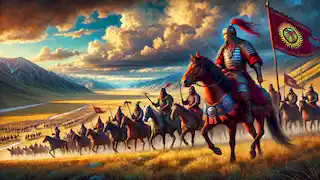
Uniting the Kyrgyz Tribes
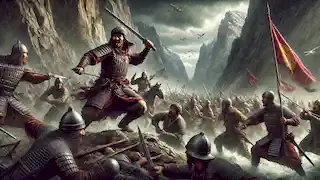
The Struggle Against the Kalmyks
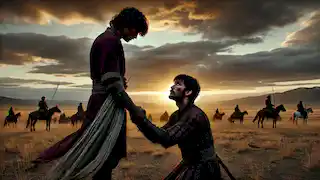
Betrayal and Redemption
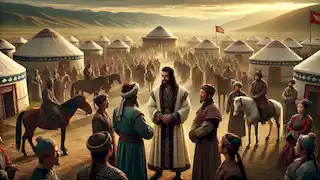
Peace and Prosperity
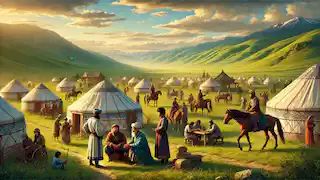
The Legacy of Manas
Conclusion


















